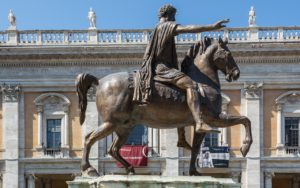YOU and Marcus Aurelius and his book “Meditations
One of the world’s most famous and influential books,
Meditations, by the Roman emperor Marcus Aurelius incorporates
the stoic precepts he used to cope with his life as a warrior and
administrator of an empire. Ascending to the throne in A.D. 161,
Aurelius found his reign beset by natural disasters and war. In the
wake of these challenges, he set down a series of private
reflections, outlining a philosophy of commitment to virtue above
pleasure and tranquility above happiness.
Marcus wrote for himself, to improve himself, to consider what
and who he should be; as a result, he wrote a guide for the rest of
of us.
Self-perception, self-examination, and the power to make of itself
whatever it wants. it reaches its intended goal, no matter where
the limit of its life is set. Marcus Aurelius makes comments and
points based on faith and as a believer, I like that.
Marcus Aurelius kept a diary and “Meditations” is from those
journals and writings.
There are different translations and you just have to find a
translation that works for you. But, they all will follow the thought
process and wording of Marcus Aurelius’.
“Meditations” are unique in classical literature because it is the
personal and philosophical diary written in Greek by an
intellectual Roman emperor without any thought or intention of
publications – and remain of unique interest and relevance to the
modern world. A lot of his thoughts and writings in the
diary is held by many when reading them today.
I loved reading his biography many years ago by Anthony R>
Birley. I am sure there are other biographies about Marcus.
Here he was a Roman Emperor and writing about:
CHARACTER
RESPECT
HELPING OTHERS
BEING BLESSED
The following could be said by any number of motivational
speakers today:
“Do not imagine that, if something is hard for you to achieve, it is
therefore, impossible for any man but rather consider anything that
is humanly possible and appropriate to lie within your own reach
too.”
How wonderful to know that thought from a Roman Emperor?
TRUTH
“If someone can prove me wrong and show me my mistake in any
thought or action, I shall gladly change. I seek the Truth, which
never harmed anyone; the harm is to persist in one’s own self-
deception and ignorance.
CHANGE
Here we are, how many centuries beyond Marcus Aurelius, a stoic
prince who became an Emperor, after Hadrian who as far as I have
read never thought that deeply about much except his next move
as Emperor. And I did read a biography of him and the Hadrian
wall and all his wars and being away from Rome for long periods
of time.
JOY
PEACE
LOVE









